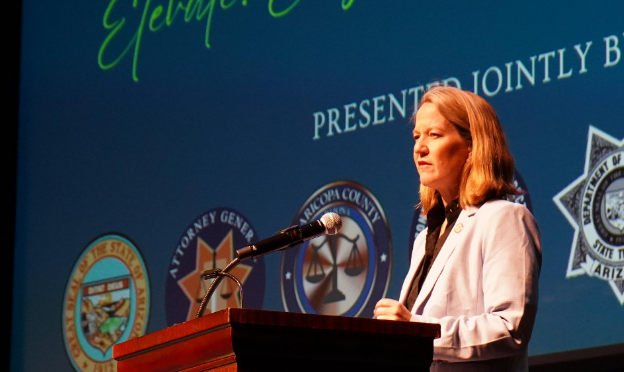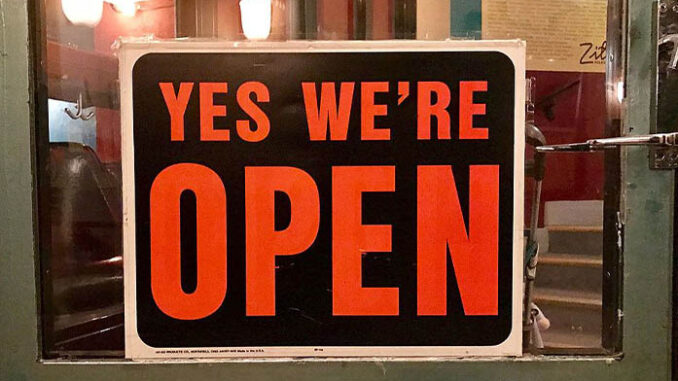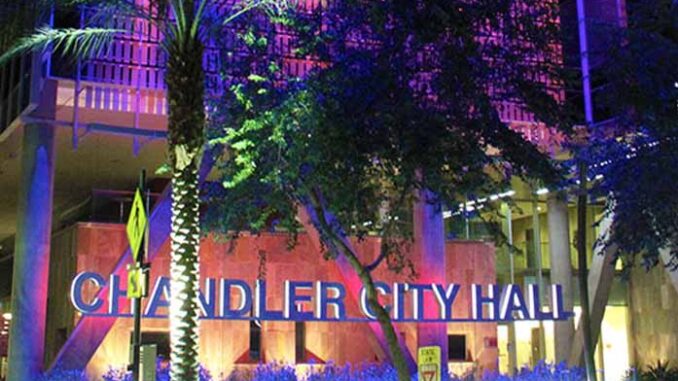
by Matthew Holloway | Oct 17, 2025 | News
By Matthew Holloway |
Rep. Eli Crane (R-AZ-02) has introduced the North Rim Restoration Act of 2025 to streamline federal contracting and accelerate recovery from the Dragon Bravo Fire.
The fire, sparked by lightning on July 4, burned 145,504 acres in Grand Canyon National Park and the Kaibab National Forest before being declared fully contained, almost four months later, on September 29th. It destroyed key infrastructure across the parks, including the historic Grand Canyon Lodge, leading to partial closures of the North Rim that are likely to continue throughout the 2025 season. The closures have reportedly impacted park staff, local communities, and the tourism revenue from the site that generates billions annually for Arizona’s economy.
The bill grants the National Park Service emergency contracting authority to bypass standard procurement delays for fire recovery efforts, including forest management, maintenance, rebuilding, and infrastructure upgrades. It requires the agency to submit progress reports to Congress every 180 days.
Original cosponsors include Reps. Andy Biggs (R-AZ05) and Abe Hamadeh (R-AZ08), as well as House Natural Resources Committee members: Subcommittee on Oversight and Investigations Chairman Paul Gosar (R-AZ09), Subcommittee on Federal Lands Chairman Tom Tiffany (R-WI07), Congressional Western Caucus Chairman Doug LaMalfa (R-CA01), and Rep. Celeste Maloy (R-UT02).
“While the Dragon Bravo Fire dealt a setback for Northern Arizona, we won’t let this tragedy define our future. We have an opportunity to rebuild stronger and better than before, and we can’t let unnecessary regulations get in the way,” Crane said in a statement. “This legislation paves the way for an efficient recovery, and I’m grateful for the bipartisan support on this approach. I also want to thank our heroic firefighters and first responders who brought the fire to full containment, as well as the local leaders in Coconino County who are committed to restoring this treasured place.”
The Coconino County Board of Supervisors praised the act stating, “Coconino County supports the North Rim Restoration Act, which gives the National Park Service the ability to respond swiftly and thoughtfully, not only to rebuild the physical structures, but to restore the enduring spirit of the Grand Canyon’s North Rim. We are deeply grateful to Representative Crane for championing this legislation and recognizing the devastation caused by the Dragon Bravo Fire and the heartbreaking loss for everyone who treasures this extraordinary place.”
Crane previewed the bill in an Oct. 9 post to X, writing, “Tomorrow, I’m introducing the North Rim Restoration Act of 2025. This legislation will eliminate bureaucratic hurdles and expedite the rebuild of the Grand Canyon. While the Dragon Bravo Fire dealt a setback for #AZ02, we won’t let this tragedy define our future.”
Crane also announced the availability of low-interest federal disaster loans via the U.S. Small Business Administration in early September. The loans will assist businesses, nonprofits, and tribal nations that endured economic losses from the Dragon Bravo and White Sage fires.
The bill has been referred to the House Committee on Natural Resources.
Matthew Holloway is a senior reporter for AZ Free News. Follow him on X for his latest stories, or email tips to Matthew@azfreenews.com.

by Staff Reporter | Oct 16, 2025 | News
By Staff Reporter |
Attorney General Kris Mayes says recently elected congresswoman Adelita Grijalva must be sworn in, or else she will take legal action against House leadership.
Statewide certification occurred on Tuesday. After, Mayes sent a letter threatening House Speaker Mike Johnson with legal action should Grijalva not be sworn in promptly. Grijalva assumed the seventh congressional district seat vacated by her father, Raúl Grijalva, in a special election last month.
“Failing to seat Ms. Grijalva immediately or to otherwise provide a reasonable explanation as to when she will be seated will prompt legal action,” said Mayes in her demand letter.
Representative-elect Grijalva received nearly 70 percent of the 102,000 votes certified, a “substantial share” of which were mail-in ballots. There are about 440,000 registered voters in the district, which would mean Grijalva was elected by just 16 percent of all active registered voters in the district.
Even though Grijalva represents far less than a quarter of voters in her district — and her father was virtually absent from two whole sessions of Congress — Democrats insist on the relevance of immediate representation for the seventh congressional district.
In an accompanying press release, Mayes blamed the delay to swear in Grijalva on “political games.”
“It’s way past time for Mike Johnson to stop the political games and seat Adelita without delay,” said Mayes. “We are keeping every option open to us, including litigation, to hold him accountable and make sure that Adelita is able to begin her work as Arizona’s newest member of Congress.”
Grijalva has also been accused of political games with her demands to be sworn in prior to the certification of the special election, which would officiate the results.
The Democratic Women’s Caucus — and a few male Democratic electeds — marched the Capitol hallways chanting “Swear her in!” with matching political signs that read, “Every American Deserves Representation. Swear in Adelita Grijalva Now.”
Johnson was not in the Capitol during this display, as he was reportedly attending the ceremony to award the late Turning Point USA founder Charlie Kirk with the Presidential Medal of Freedom on what would have been his 32nd birthday. Kirk was assassinated by a progressive activist last month.
A Johnson aide told CNN that Grijalva is one bargaining measure to pressure Democrats to lift the ongoing government shutdown, which has lasted over two weeks now.
Grijalva insists there’s more to the story. The representative-elect claims Johnson’s delay doesn’t have to do with the shutdown but with her support for releasing the Epstein files. Grijalva’s signature would ensure their release.
Mayes addressed the Johnson aide remarks in her demand letter.
“Arizona’s right to a full delegation, and the right of the residents of CD 7 to representation from the person they recently voted for, are not up for debate and may not be delayed or used as leverage in negotiations about unrelated legislation,” said Mayes.
AZ Free News is your #1 source for Arizona news and politics. You can send us news tips using this link.

by Matthew Holloway | Oct 16, 2025 | News
By Matthew Holloway |
President Trump’s historic Gaza ceasefire deal, signed Monday with Palestinian leaders and Israel, has sparked rare bipartisan praise from Arizona’s elected officials.
Congressman Andy Biggs (R-AZ05) wrote from the gubernatorial campaign trail, “This incredible day is happening because of President Trump’s strength and determination to bring peace to the region.”
However, he has also raised the alarm regarding post-deal barbarism from Hamas, with reports of public executions in Gaza streets just hours after inking the treaty. “Hamas is carrying out barbaric executions… They must do so expeditiously or face consequences for violating the ceasefire,” he posted on X.
Kudos have poured in from Democrats as well, with Sen. Mark Kelly offering Trump a rare bipartisan praise. “I think he should get a lot of credit. I mean, this was his deal. He worked this out. He sent Steve Witkoff and Jared Kushner over to negotiate this, and it so far has gone well,” Kelly told CNN’s Dana Bash on “State of the Union.”
Kelly hailed the hostage returns and the flood of aid trucks that “should have been happening over the last two years.” Kelly, however, cautioned, “I am concerned that they may change their minds here.”
Kelly posted on X: “After two years, this is a real opening for peace that will release the hostages and get desperately needed aid to civilians in Gaza. There’s a lot more work to see this through, but I appreciate the work of President Trump, the administration, and our international partners to reach this point.”
Senator Ruben Gallego notably avoided lauding the Trump administration in his statement on Monday, merely calling the peace “profoundly overdue.” He wrote, “After two long years, the final Israeli hostages have returned home. This day is profoundly overdue, and my heart is with the families whose unwavering hope and perseverance made it possible. Their return marks an important step toward peace. I remain steadfast in the belief that the United States must continue its efforts to ensure humanitarian aid reaches Palestinians and that Gaza is rebuilt.”
Congressman Abe Hamadeh (R-AZ08), who has been instrumental in the administration’s Middle East diplomacy, wrote a lengthy statement, saying in part: “In a day some thought would never come, the remaining Israeli hostages have been freed and returned to their families.”
Hamadeh added, “It was a day 737 days in the making and one that wouldn’t have been possible without the bold leadership of President Trump and the hard diplomatic work of Secretary of State Marco Rubio, Steve Witkoff, Jared Kushner, and the entire Trump Administration.”
Hamadeh asked God for blessings for the returning hostages, their families and the families of those whose remains were returned adding, “It is my fervent hope that the bodies of those who haven’t been returned are located and returned soon.” He concluded: “Blessed are the peacemakers who fought so hard on behalf of these families amidst overwhelming odds and overwhelming uncertainty.”
Arizona Senate President Warren Petersen (R-LD14) offered very direct praise from the State House, naming the President simply “the peacemaker.” He wrote, “Peace in the Middle East. Thank you, @realDonaldTrump, the peacemaker.”
State Rep. Alma Hernandez (D-LD 10) provided a particularly raw and emotional take as well from the Democrat side of the aisle, posting about her openly sobbing over reunion videos only to wake in fresh grief for the families learning their loved ones wouldn’t return.
Though she didn’t directly credit the administration, she wrote, “While we are all overjoyed and celebrating the return of the 20 hostages, let’s not forget those families who anxiously waited for over two years to find out this morning that their loved one was not returning alive… I can’t imagine the feeling of great heartbreak & sorrow those families are feeling right now. They held on to every ounce of hope… my heart goes out to them, and I pray that they will overcome this tragedy.”
Notably, as of this report, no statements from Governor Katie Hobbs, Attorney General Kris Mayes, or Secretary of State Adrian Fontes praising the administration were publicly available, despite all three being vocal on the topic of the Hamas-Israel conflict.
Matthew Holloway is a senior reporter for AZ Free News. Follow him on X for his latest stories, or email tips to Matthew@azfreenews.com.

by Ethan Faverino | Oct 16, 2025 | Economy, News
By Ethan Faverino |
The National Federation of Independent Business (NFIB) Small Business Optimism Index dropped 2 points in September to a score of 98.8, marking the first decline in three months.
Despite remaining above the 52-year average of 98, the dip reflects growing concerns among small business owners grappling with inflationary pressures, supply chain disruptions, and persistent labor shortages. The Uncertainty Index climbed 7 points to 100, making it the fourth-highest reading in over 51 years.
NFIB Chief Economist Bill Dunkelberg said, “Optimism among small business owners decreased in September. While most owners evaluate their own business as currently healthy, they are having to manage rising inflationary pressures, slower sales expectations, and ongoing labor market challenges. Although uncertainty is high, small business owners remain resilient as they seek to better understand how policy changes will impact their operations.”
In Arizona, small business owners echoed with national concerns: “Unfortunately, Arizona small business owners are facing the same sort of challenges we see in the national survey,” NFIB State Director Chad Heinrich said. “The ongoing labor shortage and inflationary pressures are giving small business owners pause in this economy. They’re focused on meeting their customers’ needs and retaining their workforce.”
Key findings from the September survey include:
- Inflation and Supply Chains: Inflation emerged as a significant issue, with 14% of owners citing it as their top business problem, up 3 points from August. A net 24% raised selling prices, up 3 points, and a net 31% plan to increase prices in the next three months, up 5 points. Supply chain disruptions impacted 64% of owners, a 10-point jump from August.
- Labor Market Struggles: 32% of owners reported unfilled job openings, unchanged from August. Of the 58% that are hiring or trying to hire, 88% faced a shortage of qualified applicants. A net 16% plan to create jobs in the next three months (up 1 point) is the highest since January 2025. Labor quality is tied with taxes as the top concern, cited by 18% of owners.
- Inventory and Sales: A net negative 7% viewed current inventory as “too low,” down 7 points—the largest monthly decline in the survey’s history. A net negative 7% reported higher nominal sales over the past three months, up 2 points, but a net 8% expect higher real sales volumes (down 4 points).
- Earnings and Investments: Actual earnings improved, with a net negative 16% reporting profit trends, up 3 points, and the highest since December 2021. Among those with lower profits, 33% cited weaker sales and 17% pointed toward material costs. Capital outlays remained steady, with 56% of owners reporting expenditures, primarily on equipment and vehicles.
- Financing Challenges: A net 7% reported tougher loan conditions, up 4 points and the highest this year. The average rate on short-maturity loans rose 8.8%. Regular borrowing increased, with 26% of owners reporting loans, up 3 points.
Despite these challenges, 57% of owners rated their business health as “good,” up 3 points, while 11% said “excellent,” down 3 points.
Taxes and labor quality tied as the top concerns, each cited by 18% of owners, while poor sales (10%) and government regulations (6%) remained notable issues.
Ethan Faverino is a reporter for AZ Free News. You can send him news tips using this link.

by AZ Free Enterprise Club | Oct 15, 2025 | Opinion
By the Arizona Free Enterprise Club |
What’s most likely to get your local officials fired up to fight for you? Lower utility rates? Wrong. Removing sexually explicit material from our libraries? Nope. How about just filling potholes in our roads? You’d think so. But what really gets the local officials in Chandler going is making sure they can sit on city council or as mayor longer.
Proposition 410, a local ballot measure, seeks to amend the city charter’s term limit section to extend the term for how long councilmembers and the mayor can serve. The measure is particularly problematic because it directly benefits a sitting councilmember, Matt Orlando, allowing him to run for mayor in 2026 without interruption after finishing his second consecutive council term. This proposition is not about reigning in political power; it’s about conveniently clearing the path for one councilmember to extend his political career. If it doesn’t pass in November, Orlando will face issues being elected mayor after his stint on the council, and clearly, he can’t have that.
The current city charter provision essentially says that one person can serve no more than two consecutive terms as councilmember, mayor, or a combination of both, and must wait four years before running again for either office. Therefore, someone can only serve two consecutive terms total.
However, some argue this language is ambiguous, allowing for another interpretation, one that allows a person to serve up to sixteen consecutive years: eight as a councilmember and eight as mayor. This interpretation has been the practice in Chandler for the past three mayors. Kevin Hartke, Boyd Dunn, and Jay Tibshraeny each served eight years as councilmembers and eight years as mayor – sixteen consecutive years.
The proposed language change on the ballot effectively attempts to legitimize the last three mayors by expanding the term limits in the city’s charter. It now states that a person can serve up to two consecutive terms as councilmember and two consecutive terms as mayor, sixteen years total. After reaching either limit, or a combined sixteen consecutive years in both offices, they must wait four years before running again for either position.
Why the rush for a change?
>>> CONTINUE READING >>>





